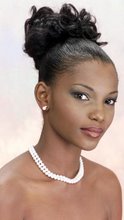We're Going to a Job Fair and We're Going to Take..
Adapted from Employer Expectations of Students Attending Job Fairs by Amber Palomares, NACE Journal, Winter 2000.
Job fairs provide a great opportunity for you to meet employers who represent a wide range of industries, and in some instances, obtain interviews with them. If you make a favorable impression, you have the best chance of being invited to interview.
But what can you do to stand out in the crowd of college job seekers?
Employers attending "JobFest" at the University of South Carolina were asked about the characteristics of students who make a good impression-and those who make a bad (and lasting) impression.
Be Prepared for the Job Fair
Not all employers will conduct preliminary interviews at the job fair, but if you're serious about your job search, you should go prepared to talk to potential employers.
Research: More than a third of employers said they expect you to know something about their companies or organizations. To prepare for this, check your career center web site a couple of days before the job fair to see there is a list of attending companies-perhaps with links to the organizations' web sites. Look for flyers about the job fair that contain employers' web addresses. Ask for information on companies at your career center.
Dress to impress: To create a good first impression, you can't go wrong by dressing as if you are going to a job interview. Most employers reported that they consider business casual appropriate for job fairs-and many of the employers at JobFest were casually dressed. However, some employers said that a common mistake students make is "not being dressed professionally."
Take supporting documents: Upon request, you should be able to supply potential employers with the following:
Cover letter
Hard copy and/or scannable resume*
Reference letters*
Professional portfolio, including examples of work and accomplishments*
Transcript copy
Completed job application
*In general, only employers who conduct formal interviews at job fairs (21 to 27 percent) expect students to provide a scannable resume, reference letters, and a portfolio.
Meeting and Greeting
There's a certain etiquette practiced at job fairs. Making a mistake won't necessarily knock you out of the running for a job with an employer, but if your goal is to stand out from the crowd, you don't want a mistake to be the thing that makes your visit memorable. Here are some of the mistakes employers said students commonly make:
Saying, "I'll take anything" or "I don't know" when asked about interests shows a lack of focus. (Tip: Seek the expertise of career counselors at your career center or what you can do with your major.)
Dressing unprofessionally or in casual clothing.
Lacking a resume to leave with interested employers.
Confusing a company with its competitor or not knowing anything about a company.
Lacking enthusiasm or interest in a company or job opportunities.
Asking about salary.
Asking inappropriate questions, not asking questions, having a poor or unprofessional attitude. (Tip: Your career center probably has examples of good questions to ask.)
Grabbing free stuff.
Lacking communication skills, including not making eye contact and having a weak handshake.
Not being willing to relocate.
Some employers will expect you to complete their job applications while you are at the job fair, so be sure to bring information that may not be included on your resume. Information may include: addresses and telephone numbers of former employers; addresses and dates of attendance for high school and other schools; and contact information for references.
Follow-up From Your Fair Experience
Most employers said they follow up with students within two to four weeks after the job fair to request an interview. They also expect some kind of follow-up from you-a cover letter, phone call, or a completed job application-and may not extend an invitation to interview if you fail to take this initiative.
Time spent at a job fair pays off. It's your chance to see many of the career opportunities that are open to you and you may connect with potential employers who, ultimately, can offer you a job. If you make a favorable impression, you are more likely to be invited to interview.
